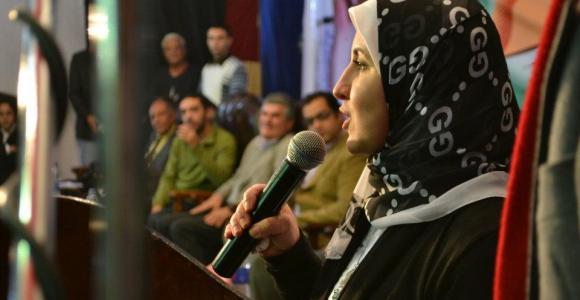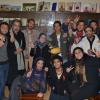Noha Al Sharkawy writes on her first experience as a parliamentary candidate
Blog Post
Nomination for parliamentary elections after the revolution was a rich and unique experience for me. In the beginning, my name was suggested by some of my friends who are political activists. I knew that this idea was welcomed by the prominent Egyptian scientist, Prof. Mohammed Ghoneim, who was at that time the Coordinator of the electoral coalition Al-Kotla Al-Mesreya or the "Egyptian Bloc". This encouraged me as I was hesitant at first fearing that I am still unqualified to undergo this experience. Later, political disagreements took place between the party of Al-Mesreyeen Al-Ahrar, or "the Free Egyptians" and other parties during preparations of electoral lists. Dr. Ghoneim started preparing for the lists of "the Revolution Continues" [Al-Thawra Mostamera] coalition in which I was honored to be one of the candidates for the first district of the governorate of Daqahleya (This electoral district includes the administrative departments of Mansoura-one, Mansoura-two, district of Mansoura, Belqas, Talkha, Gamasa, and Nabarouh).
It was not easy to start as I was still young with no previous experience in nomination for the Parliament, or party politics, in addition to being a woman. My whole political experience was two years old, as one year before the revolution I joined the popular campaign for nominating Dr. Mohammed Al-Baradie for presidency. Then, I founded the branch of this campaign in Daqahleya with some of my colleagues. Later, I joined the National Association for Change when it was established. The establishment of the Association opened the way for persistent work with citizens to convince them with the possibility for change and encourage them to sign the Change Statement. Later on, we all participated in the preparation for the 25th of January 2011 and the events that followed.
My nomination was opposed by some people, especially old politicians who believe that elections need physical strength, loud voice, boldness, and experience in working with people. I was made the sixth candidate on the list although I was told in the beginning that I will be placed in a high position on the list as a gesture of support for revolutionary youth. I had to prove that young people are trustworthy and deserve more opportunities, especially women. We strived before and during the revolution to change an oppressive regime. Likewise, we had to continue the road and help build modern political life in our country. This happened with time as my position on the list was changed and became the third after a period of serious work.
There were many challenges. First of all, time was running as all of us (revolutionary forces) engaged in the events of Mohammed Mahmoud Street and didn't start real electoral campaign except for three weeks in which we were supposed to make all forms of campaigning including canvassing and conferences. Second, most revolutionary youth decided to boycott elections in protest to the events of Mohammed Mahmoud Street which led to lack of volunteers working in the electoral campaign and mobilizing young people to vote. Third, I personally had difficulty dealing with huge crowds in public conferences and gaining their support for the list as I was not trained to address masses that are huge in number and culturally diverse. Moreover, Egyptian citizens are not used to accept young candidates, especially women. The typical image of a candidate for the Parliament is a strong man who is influential or wealthy.
We started work by forming a team for the electoral campaign consisting of a small number of young people. We put a concise electoral programme for me as a candidate, in addition to the official programme of the list Al-Thawra Mostamera. We made a page and a group on FaceBook to publish the programme and make use of modern tools in campaigning. We started working on the ground through canvassing in the streets of Mansoura and Belqas to distribute leaflets and talk to citizens. I spoke in many conferences in villages and cities of the district. The most successful thing I did was to make visits to governmental offices and meet workers therein which were positively welcomed by them and made us very happy.
The most important observations I had from this experience are as follows:
1 – For middle, upper middle, and higher classes, they strongly accepted a young woman as a candidate. They just needed a prove of the credibility of the candidate which I consider one of my points of strength when I deal with citizens. Honest talk easily reached people and helped change some of their traditional concepts about politicians who use false promises to gain the support of voters.
2 – In rural areas, women and the youth were very welcoming. Discussions and friendly gestures were reasons for optimism.
3 – Family ties were huge obstacle in front of my campaign even in the village of my father because of the existence of Islamist candidates from the same village. There candidates relied on three main points to compete with our list. First, making use of the services they provide for the people of the village. Second, using religion to attract voters and make them resent democratic forces at the same time. Third, using hostile rumors against Al-Thawra Mostamera List and its political sponsor Dr. Mohammed Ghoneim. Nevertheless, the list achieved relatively good results.
4 – We need a lot of good preparation and training to carry on such a huge campaign against political forces which practiced politics and electoral campaigning for many years. What we mainly lack is trained cadre of candidates and observers of the electoral process.
I was lucky to know the team of Nazra for Feminist Studies at the beginning of the electoral campaign. They highly contributed to develop my performance in front of the public. They helped me arrange my thoughts before giving my speech especially in the final conference in Mansoura city which had a positive impact on me as a candidate. The mentoring done by Nazra team was very useful for me, and they also helped train the members of my campaign to observe voting and counting at the end of the campaign, which helped us improve capacity to work through the different stages of the electoral process to the extent that members of Freedom and Justice Party praised Al-Thawra Mostamera team.
5 – At the end of this experience, a large group of young people who became enthusiastic to our list and contributed to mobilization and observation efforts especially in the district of Mansoura was formed. Results were fascinating especially that time was short and resources were limited, especially money and media. Among the most important results is the fact that those who were not convinced that young people can compete in elections realized they were wrong, and that it is possible to present a new atypical image of parliamentary candidates who are capable of representing many sectors of young people believing that credibility, honesty and eager desire to develop are the most important assets for candidates.



